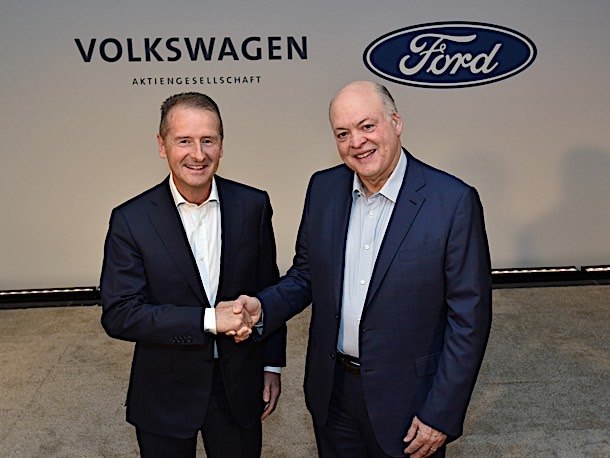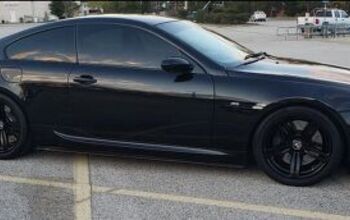Ford to Use VW Electric Vehicle Platform in Europe, Truck Collaboration on Track
Developing electric cars for scale in Europe takes time, money, resources and commitment. Volkswagen has the new, advanced MEB architecture designed just for that purpose. There are other automakers, though, who need to have an option. For Ford, that answer was simple. They already are working with VW on several projects, so it makes sense to expand that relationship into platform sharing.
In an announcement that also included VW’s investment into Argo AI, Volkswagen committed to providing 600,000 MEB units to Ford for a new electric vehicle that’ll be manufactured and sold within Europe. That includes all of the electric components, according to Dr. Herbert Diess, VW’s CEO. Ford’s CEO Jim Hackett said that it would be “built Ford proud.”
Both executives confirmed that they are working on a second agreement to provide more of these units to Ford for a second vehicle that is in the pipeline, though they were both limited on details for that product — other than they are in the planning stages.
The MEB platform is versatile. It works as high-volume city cars all the way up to camper vans. Hackett mentioned that the MEB vehicles that Ford produces will be “suited for European roads.” Customers in Europe expect a certain feel from the cars they buy that is different than what people in the United States do, so it makes sense to build a vehicle for that market there that is also tailored for it.
The first EV, a crossover, goes on sale in 2023.
Both executives confirmed that plans are still on track for building commercial vehicles and trucks for select global markets. Those markets include Europe, Africa, the Middle East, Asia Pacific and South America. The first vehicle of this joint project could be on the road as early as 2022.
Volkswagen’s investment in Argo ($2.6 billion in capital and assets), along with Ford’s existing investments, makes Argo AI a “technology platform company,” and they are working hard to develop and test autonomous systems. But, before all of that, VW and Ford’s relationship grows stronger with new products hitting the streets soon.
[Image: Ford]
More by Chad Kirchner
Latest Car Reviews
Read moreLatest Product Reviews
Read moreRecent Comments
- FreedMike Awfully nice car.
- Cprescott So is this going to lie and tell you that they have quality products at affordable costs that won't get recalled?
- SCE to AUX So they might continue gigacasting 3 pieces instead of 1. Tesla does gigacasting as a business advantage, so they aren't abandoning it. They probably ran into some tech challenge related to integrating 3 pieces into 1, so 3 will do.Meanwhile Toyota and several Chinese mfrs are adopting gigacasting because of Tesla.
- Tassos Great Choice, far better than an ES350. I prefer one size larger and a V8 as in the LS460, but it is probably not as agile as the GS.And thus spake the REAL TASSOS.
- Ajla "appealing to its customers"


































Comments
Join the conversation
What could possibly go wrong?
This is the new American way, which is to let other countries do the hard core engineering and design. After that just slap your name on the foreign designed product.